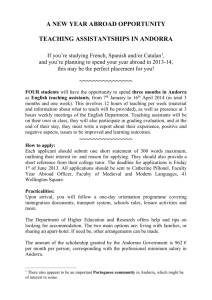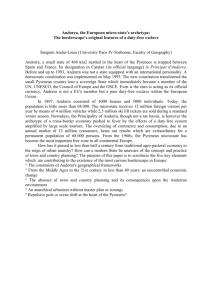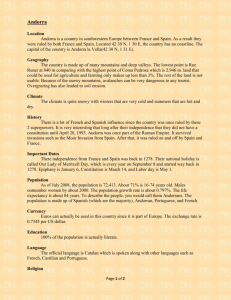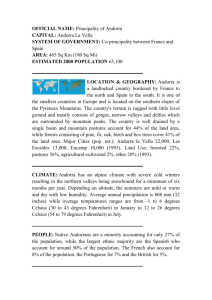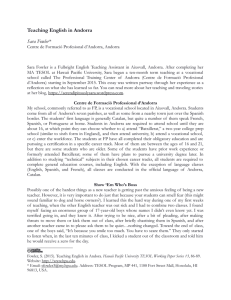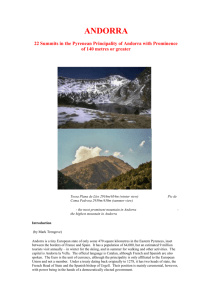A General Assembly Report of the Working Group on the Universal
advertisement
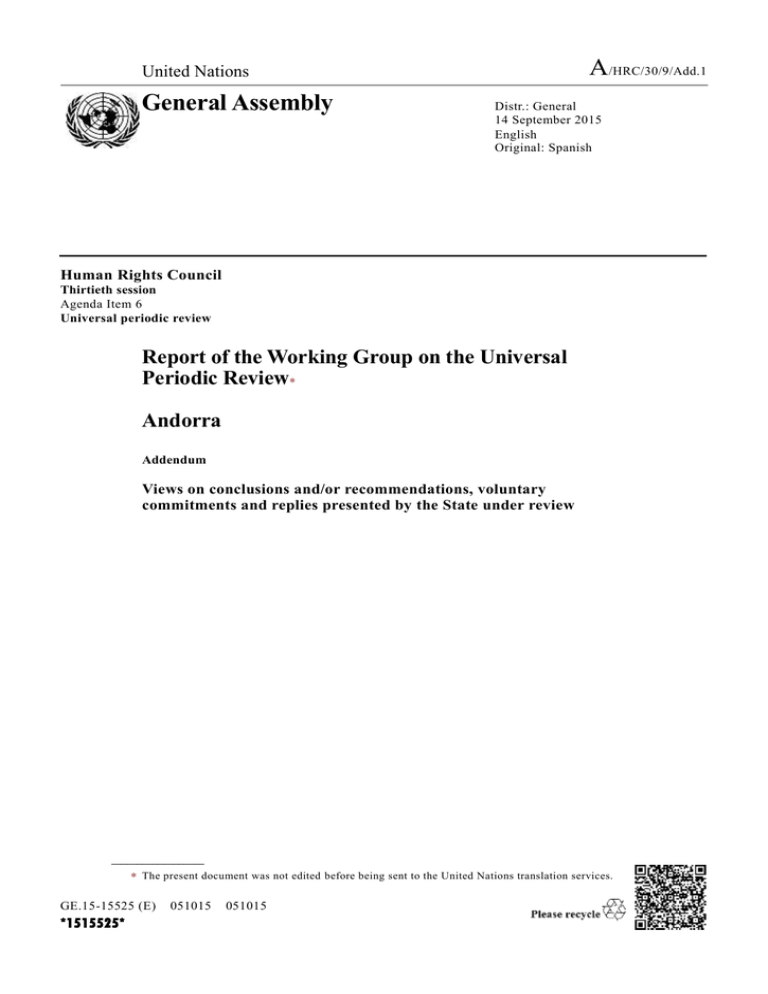
A/HRC/30/9/Add.1 United Nations General Assembly Distr.: General 14 September 2015 English Original: Spanish Human Rights Council Thirtieth session Agenda Item 6 Universal periodic review Report of the Working Group on the Universal Periodic Review Andorra Addendum Views on conclusions and/or recommendations, voluntary commitments and replies presented by the State under review __________________ The present document was not edited before being sent to the United Nations translation services. GE.15-15525 (E) *1515525* 051015 051015 A/HRC/30/9/Add.1 1. Andorra submitted its second report under the universal periodic review (UPR) on 7 May 2015; during its presentation, 39 member States took the floor and made 85 recommendations. 2. On 12 May 2015, the Working Group on the Universal Periodic Review approved the recommendations section. Andorra declared that it accepted 9 recommendations, would take into consideration a further 2 and postponed its position on the remaining 74. 3. Andorra wishes to alter its position on the two recommendations taken into consideration (85.1 and 85.2). 4. In the view of Andorra, recommendation 85.1 has already been implemented. As stated in the national report and the report of the Working Group on the Universal Periodic Review, the most recent amendment to the Criminal Code ma rked the completion of the process of the criminalization of the offence of trafficking in persons. 5. In the view of Andorra, recommendation 85.2 has also been implemented. The amendment to article 476 contained in Act No. 40/2014, explicitly prohibits co rporal punishment, as explained during the presentation of the national report and in the report of the Working Group on the Universal Periodic Review. 6. Taking the above into consideration, Andorra wishes to accept the two abovementioned recommendations, given that they have both already been implemented. 7. The Ministry of Foreign Affairs was given the task of compiling the recommendations and communicating them to the relevant Government departments for consideration. 8. During this second cycle of the universal periodic review, Andorra accepts 41 recommendations and takes into consideration the remaining 44. 9. The present report has been submitted to the Consell General (parliament) and the Raonador del Ciutadà (Ombudsman) and disseminated among civil society actors through the official media. 10. The following is a table listing the 74 recommendations awaiting approval, along with the position adopted by the Government of Andorra and the corresponding explanatory notes. Recommendations Positions Explanatory notes 84.1 Taken into consideration Andorra undertook to study the legislation in detail in order to assess whether any measures needed to be taken in that regard. Andorra reiterates its commitment, without prejudice to any future move to fully align its national legislation with the Rome Statute of the International Criminal Court. 84.2 Taken into consideration Andorra expressed its willingness to continue to ratify the main international human rights instruments, but highlighted the need to carry out prior in-depth studies of the laws relating to each of the international instruments in question before it could accede to any of them. Andorra is prepared to become a party to the 2/9 GE.15-15525 A/HRC/30/9/Add.1 Recommendations Positions Explanatory notes Optional Protocol to the Convention against Torture and Other Cruel, Inhuman or Degrading Treatment or Punishment. 84.3 Taken into consideration Andorra will examine its national legislation relating to each of the international instruments in question, without prejudice to any future move to become a party to them. Andorra is prepared to become a party to the Convention against Torture and Other Cruel, Inhuman or Degrading Treatment or Punishment. 84.4 Taken into consideration Andorra cannot undertake to ratify the Convention in question. 84.5 Taken into consideration See 84.4. 84.6 Taken into consideration Andorra is not currently in a position to undertake to study the Convention in question but will do so with regard to the other international human rights instruments referred to in other recommendations. 84.7 Taken into consideration See 84.6. 84.8 Taken into consideration Andorra is not in a position to become a party to the International Covenant on Economic, Social and Cultural Rights, but will examine its legislation in line with recommendations 84.2 and 84.11. 84.9 Taken into consideration See 84.8. 84.10 Taken into consideration See 84.8. 84.11 Accepted Andorra will examine its legislation from the point of view of the provisions of the International Covenant on Economic, Social and Cultural Rights, without prejudice to a final decision on accession. 84.12 Taken into consideration See 84.8. 84.13 Taken into consideration See 84.8. Andorra agrees to become a party to the Optional Protocol to the Convention against Torture and Other Cruel, Inhuman or Degrading Treatment or Punishment. GE.15-15525 84.14 Accepted 84.15 Accepted 84.16 Taken into consideration See 84.2. 84.17 Taken into consideration See 84.2. 84.18 Accepted 84.19 Taken into consideration Andorra is not a member of the International Labour Organization (ILO) and cannot become a 3/9 A/HRC/30/9/Add.1 Recommendations Positions Explanatory notes party to its conventions. However, national labour legislation is in line with the main ILO conventions. Title II, Chapter 5 “Child Labour”, of the Labour Relations Code takes into account the provisions of the ILO Minimum Age Convention, 1973 (No. 138) . 84.20 Taken into consideration Andorra is not a member of the International Labour Organization (ILO) and cannot become a party to its conventions. There are no specific regulations covering domestic workers as a group. However, they are guaranteed the same rights as other workers. 84.21 Taken into consideration Andorra is not a member of the International Labour Organization (ILO) and cannot become a party to its conventions. However, articles 4, 45 and 74 (2) of the Labour Relations Code provide for non-discrimination on the grounds of sex. 84.22 Taken into consideration Andorra only has limited resources in terms of membership of the full range of international organizations. Despite that, national labour legislation is in line with the relevant international standards and compliance with the main ILO conventions has been achieved. Those conventions are also implemented in the form of supplementary law, in accordance with the Labour Relations Code. 84.23 Accepted Andorra will carry out a study in this regard, without prejudice to a final decision on accession. 84.24 Taken into consideration As host to a migrant population drawn mainly from neighbouring or nearby countries, Andorra has a distinctive demographic makeup. The presence of three public, free education systems (Spanish, French and Andorran) has facilitated the integration of migrants into Andorran society. Moreover, in 2008, Andorra ratified Protocol No. 12 to the Convention for the Protection of Human Rights and Fundamental Freedoms, which provides, among other things, that the rights and freedoms set forth by law shall be guaranteed without discrimination on any ground. However, Andorra does not currently have any plans to become a party to the Framework Convention for the Protection of National Minorities. 84.25 4/9 Taken into consideration The amendment of national legislation with the aim of decriminalizing abortion under certain circumstances, as recommended, would involve the amendment of article 8 (1) of the Constitution, which guarantees the right to life and its full GE.15-15525 A/HRC/30/9/Add.1 Recommendations Positions Explanatory notes protection at all stages of existence. 84.26 Taken into consideration See 84.25. 84.27 Taken into consideration Andorra already has an Adoption and Protection of Abandoned Minors Act, of 21 March 1996. Over the years, provisions have been introduced into a number of sectoral laws with the aim of safeguarding children’s rights. For example, as a result of the most recent amendment to the Criminal Code, contained in Act No. 40/2014, work to criminalize physical ill-treatment, including corporal punishment, was completed. As to the identification of the roles and responsibilities of Government agencies for child protection, article 2 of the Decree of 3 January 2013, amending the regulations on adoption, provides that the Directorate for Social Services is the competent government body for the protection and care of children in situations of risk, abandonment, preadoption and adoption, further developing the provisions of the Act of 21 March 1996 in that regard. Consequently, Andorra believes that the roles and responsibilities of government agencies are already clearly defined by existing legislation. GE.15-15525 84.28 Taken into consideration Andorra is gradually codifying its civil legislation and will assess whether defamation should be decriminalized and transposed into the new Civil Code, but it cannot undertake to comply with the recommendation within the specified time frame. 84.29 Accepted In the view of Andorra, the courts and the Raonador del Ciutadà (Ombudsman) are the main guarantors of human rights in the country. However, the time is ripe for a study on the setting up of a national human rights institution (NHRI) in the country, in line with the Paris Principles, without prejudice to a final decision on the creation of such a body. 84.30 Taken into consideration Andorra cannot guarantee that it will set up an NHRI but a study on the issue will be carried out, in line with recommendation 84.29. 84.31 Taken into consideration See 84.30. 84.32 Taken into consideration See 84.30. 84.33 Taken into consideration See 84.30. 84.34 Taken into consideration See 84.30. 84.35 Accepted 84.36 Taken into consideration In the light of the demographic makeup and administrative structure of the country, Andorra 5/9 A/HRC/30/9/Add.1 Recommendations Positions Explanatory notes currently takes a sectoral approach to the improvement of the national human rights situation in the country, with each government ministry and department acting within its own sphere of competence. However, in line with recommendation 84.29, Andorra will look into the possibility of setting up an NHRI competent to make recommendations relating to and take part in the development of a national human rights action plan. 84.37 Accepted 84.38 Accepted 84.39 Taken into consideration As a result of the ratification of the Council of Europe Convention on the Protection of Children against Sexual Exploitation and Sexual Abuse and the amendment of the Criminal Code, provided for in Act No. 40/2014, the process of criminalizing the offence of trafficking in persons, including for the purposes of organ harvesting, slavery, servitude or sexual exploitation, is now complete. However, Andorra cannot further amend criminal legislation to extend criminal liability to juridical persons because that would involve the wholesale re-examination of the concept of criminal responsibility. 6/9 84.40 Taken into consideration In the view of Andorra, the existing national legislation makes provision for redress for victims. The authorities are permanently on the lookout for activities related to forced labour and prostitution, but, since no cases have ever been uncovered, it is not possible to design specific policies in that regard. 84.41 Taken into consideration There have never been any cases of trafficking in persons in Andorra and, consequently, the country does not have any programmes to tackle the issue. The authorities are constantly monitoring for any related offences. 84.42 Taken into consideration See 84.41. 84.43 Accepted 84.44 Accepted In the view of Andorra, the recommendation has already been implemented. The most recent amendment to the Criminal Code, contained in Act No. 40/2014, provides for the criminalization of the offence of public incitement to racial violence, hatred and discrimination. Among other things, the new article 338 (1) provides for penalties of 3 months’ to 3 years’ imprisonment GE.15-15525 A/HRC/30/9/Add.1 Recommendations Positions Explanatory notes for individuals who: • Publicly incite others to violence, hatred or discrimination against another person or group of persons; • Publicly insult, slander, defame or threaten another person or group of persons; • Publicly express, by any means, ideologies or doctrines that proclaim the superiority of, or disparage or denigrate, a group of persons; • Publicly broadcast or disseminate any material containing images or expressions used within the context of the abovementioned types of conduct. 84.45 Accepted See 84.44. 84.46 Taken into consideration The main guarantors of human rights in Andorra are the courts and the Raonador del Ciutadà (Ombudsman). In the view of Andorra, the creation of a new body would only lead to overlapping. However, in line with recommendation 84.29, steps will be taken to look into the possibility of setting up an NHRI capable of discharging the functions in question. 84.47 Accepted 84.48 Accepted 84.49 Taken into consideration 84.50 Accepted 84.51 Accepted 84.52 Accepted 84.53 Accepted 84.54 Accepted Andorra undertakes to adopt a comprehensive law on gender equality. However, given that the Andorran business sector mainly consists of small- and medium-sized enterprises, Andorra does not intend to set up a quota system to ensure parity in the membership of company boards. In the view of Andorra, the recommendation has already been implemented. Article 6 (1) of the Constitution states that all persons are equal before the law. Moreover, article 338 (4) of the Criminal Code provides that any public body or official acting in a discriminatory fashion will be sentenced to up to 1 year’s imprisonment and will be barred from holding public office for up to 3 years. The rights of persons in detention are taken therefore into account and respected, regardless of their nationality. Furthermore, additional human GE.15-15525 7/9 A/HRC/30/9/Add.1 Recommendations Positions Explanatory notes and material resources have been allocated to efforts to speed up criminal proceedings. 84.55 Taken into consideration The existing legal order makes provision for administrative and judicial appeals relating to human rights violations. The independence of the judiciary is enshrined in article 85 (1) of the Constitution. Under the Constitution, the High Council of Justice and the Public Prosecutor’s Office are responsible for the defence and enforcement of the laws and the independence of the courts (arts. 89 and 93 of the Constitution). For that reason, and in the light of the demographic makeup and administrative structure of the country, there is no need for a new institution. Furthermore, as a part of the follow-up to recommendation 84.29, Andorra will look into the possibility of setting up an NHRI competent in the sphere of allegations of police misconduct. 8/9 84.56 Accepted 84.57 Taken into consideration Andorra is currently negotiating an Association Agreement with the European Union and, once that process is completed, will look into the possibility of revising its legislation on nationality. Andorra is not currently in a position to accept this recommendation. 84.58 Taken into consideration Temporary workers’ work and residency permits are valid for a maximum of 12 months and, under the existing legislation, requests for their renewal may not be submitted until five months after the date of their expiry. Given the short duration of stay of temporary workers in the country, Andorra cannot currently amend the law to guarantee their right to family reunification. 84.59 Accepted 84.60 Accepted 84.61 Taken into consideration Freedom of ideology, religion and worship is enshrined in article 11 (1) of the Constitution. Article 11 (2) states that the freedom to manifest one’s religion or belief is subject only to such limitations as are prescribed by law and are necessary to protect public safety, order, health or morals or the fundamental rights and freedoms of others. In the view of Andorra, article 11 (3) of the Constitution only recognizes the historic relationship between the State and the Catholic Church. However, that situation in no way constitutes a restriction on the freedoms of GE.15-15525 A/HRC/30/9/Add.1 Recommendations Positions Explanatory notes worship or of religion, which are enshrined in the Constitution. GE.15-15525 Law 30/2014, on the civil protection of the right to privacy, respect and self-esteem, governs and defines the situations in which the exercise of the freedom of speech and of opinion potentially infringes the right to privacy, respect and selfesteem. In the view of Andorra, the law in question does not constitute a restriction in terms of access to information or the right to freedom of expression. 84.62 Taken into consideration 84.63 Accepted 84.64 Accepted 84.65 Accepted 84.66 Accepted 84.67 Accepted 84.68 Accepted 84.69 Accepted 84.70 Accepted 84.71 Taken into consideration Andorra does not believe that now is the right time to strengthen national policies for the promotion and protection of immigrants’ rights, given that the country’s demographic makeup continues to be atypical, with large numbers of immigrants from neighbouring or nearby countries. The presence of three free and public education systems (Spanish, French and Andorran) has facilitated the integration of migrants into Andorran society. 84.72 Taken into consideration See 84.71. 84.73 Taken into consideration Andorra is currently negotiating an Association Agreement with the European Union and, once that process is completed, will look into the possibility of bringing domestic legislation on asylum and refugees into line with the current international standards. 84.74 Taken into consideration See 84.73. 9/9
